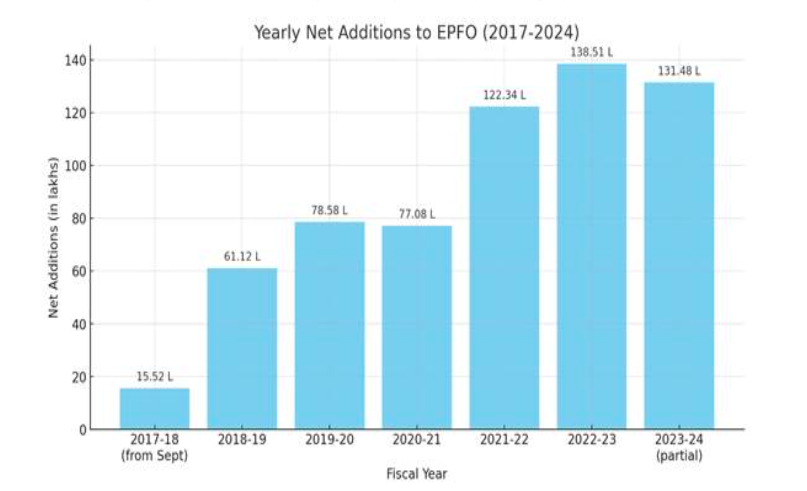15 November 2024 : PIB Summary For UPSC
1. The Transition of India’s Economy Towards Formalization
(Source – https://pib.gov.in/PressNoteDetails.aspx?NoteId=153420&ModuleId=3®=3&lang=1 )
| Topic: GS3 – Indian Economy |
| Context |
|
Formalization of the Economy: A Shift Towards Security and Stability
- India’s economy is witnessing a shift towards formalisation, redefining job structures, employment security, and social benefits for workers.
- This shift ensures that a larger segment of the population is covered by social security systems, enhancing economic stability and providing a more secure future.
- The Employee’s Provident Fund Organisation (EPFO) plays a pivotal role in this transformation by managing long-term savings and social security benefits for salaried workers.
What is Formalization of the Economy?
- Formalization refers to moving jobs from the informal sector (small, unregistered businesses, daily wage workers) to the formal sector (with contracts, job security, and benefits).
- In the formal economy, workers have legal protections such as a fixed salary, healthcare, paid leave, and retirement savings.
- Formalization ensures more people are covered by social security systems, providing stability during economic fluctuations.
What is EPFO and How Does it Benefit Workers?
- The Employee’s Provident Fund Organisation (EPFO) is a government body managing savings schemes for salaried workers.
- Both employees and employers contribute a small portion of the salary to the EPF scheme, which accumulates over time.
- The key benefits of EPFO include:
- Retirement security: Employees can rely on the EPF savings for a stable income post-retirement.
- Life insurance: Insurance coverage through schemes like Employees’ Deposit Linked Insurance (EDLI) provides safety in case of unforeseen events.
- Pension: Workers are eligible for monthly pensions upon retirement, providing continued financial support.
- Emergency and medical withdrawals: EPFO offers flexibility for withdrawing funds during emergencies, such as medical expenses, education, or purchasing a home.
How EPFO Registration Reflects Increased Formalization
- EPFO registration indicates that a worker has transitioned to a formal job with social security benefits.
- More EPFO registrations point to an increasing shift towards formal jobs, meaning more workers have access to job security, social security, and benefits.
- The rise in registrations suggests that India’s economy is becoming more organised, with companies adhering to regulations and supporting their employees.

What the Data Tells Us:
- Over 6.91 crore members joined EPFO from September 2017 to July 2024, reflecting the formalisation of jobs and enhanced security for employees.
- In the fiscal year 2022-23, 1.38 crore new members joined EPFO, showing continued progress in formalising India’s workforce.
- Data from June 2024 shows:
- Job switching and fund transfer: Many members are switching jobs but transferring their EPFO funds to ensure continued social security.
- Youth participation: A significant portion of new members are young, first-time job seekers.
- Female participation: The increase in female members highlights a positive shift towards a more inclusive workforce.
- Steady growth: Monthly EPFO registrations have been consistently increasing, with nearly 20 lakh new members joining in July 2024.
Moving Towards a More Secure Future
- The increase in EPFO registrations indicates India’s progress towards a more organised and secure economy.
- The growing formal workforce ensures better job security, social benefits, and a brighter future for workers like Ramesh.
- Formalization also provides a safety net during economic crises, as seen during the COVID-19 pandemic, and strengthens the overall economy.
| Practice Question: Discuss the role of the Employee’s Provident Fund Organisation (EPFO) in the formalisation of India’s workforce. How does this transition contribute to the economic security of workers, and what challenges might arise in the process? (250 Words /15 marks) |



